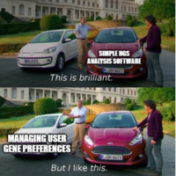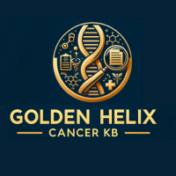At Golden Helix, we are proud to support researchers and clinicians worldwide who push the boundaries of precision medicine. Our VarSeq software continues to be instrumental in the analysis and interpretation of genetic data, enabling groundbreaking discoveries and advancements. Recently, several papers have been published that showcase the power and versatility of VarSeq in various research domains, from neurodegenerative diseases… Read more »
We are pleased to announce new training materials are available for multi-sample workflows in VarSeq! Specifically, we have a New Carrier Screening Tutorial and New Onboarding and Training guides for Carrier Screening Analysis in VarSeq, and Clinical Evaluation and Carrier Status Reporting in VSClinical. This blog gives an overview of what the user can expect to encounter when working through… Read more »
When a variant shows up as rare in the general “healthy” population, as indicated by low frequency or absence in one or more commonly referenced population catalogs such as GnomAD Exomes or 1000 Genomes, this indicates by proxy that the variant may be pathogenic. However, several factors determine the frequency threshold below which a variant is considered rare enough to… Read more »
VSPGx is a pharmacogenomics interpretation software based on CPIC recommendations. The field of pharmacogenetics bridges genetics and pharmacology, with the aim of optimizing drug therapies for individual patients based on their unique genetic makeup. It has the potential to revolutionize healthcare by improving drug efficacy, reducing adverse reactions, and advancing the concept of personalized medicine moving away from a one… Read more »
The Broad Institute’s release of gnomAD v4 needs no introduction as the data in this release is highly sought after by professionals in the genetics community, and the v4 release has a lot to boast about! The v4 release is roughly five times larger than the v2 and v3 releases combined and includes data from 807,162 total individuals. Naturally, exome… Read more »
There are several contextual factors to consider when analyzing genomic data for NGS analyses. A variant may have divergent impacts depending on which transcript of the gene is being considered, or the impact of a variant could be weighed more or less heavily depending on the disease context. Evidently, the user’s gene preferences are very important, but not all software… Read more »
Get your year started off right with Golden Helix’s new VarSeq Onboarding and Training Program! Analysis of NGS data comes with several challenges, but mastery of the data analysis software does not have to be one of them. With this in mind, Golden Helix is pleased to announce that VarSeq Onboarding and Training tools are now available to all our… Read more »
Thank you to all our viewers who attended our webcast last week on VarSeq 2.5.0: VSClinical AMP Workflow from the User Perspective. If you did not get a chance to attend but would still like to see the new upgrades to VarSeq 2.5.0, please visit our website here. Overall, this webcast highlighted the versatility of VarSeq, demonstrating both a Tumor-Normal… Read more »
I am very excited to announce that a new version of Golden Helix CancerKB has been released! This new version of CancerKB comes with some exciting upgrades bolstering the gene interpretations and cancer gene evidence. Before I jump into the details of the new information that is now in CancerKB, I want to give everyone a quick reminder of what… Read more »
Traditionally genetic tests in cancer have focused on small gene panels that restrict their analysis to a small number of well-studied cancer genes. However, as sequencing costs have decreased, many clinical laboratories have embraced comprehensive genomic profiling tests that rely on whole exome and whole genome next-generation sequencing (NGS) workflows, which can detect millions of high-quality variants for a single… Read more »
Configuring a bioinformatic pipeline to reliably process genomic data is no small task. Doing so in an efficient, consistent way is an even grander challenge. Luckily, the VarSeq software suite provides a comprehensive toolbox for automation and integration. One of the first questions a new VarSeq user might ask is where processed data needs to end up. The versatility of… Read more »
Assessment catalogs are a way for VarSeq users to save variants and variant information for clinically relevant variants, so when you come across this variant again in another sample, all of the work to analyze and classify the variant is already done! But there is more than meets to the eye when it comes to using assessments in VarSeq. Being… Read more »
The ability to import patient-level information into VarSeq and VSClinical can not only save time while evaluating a sample but can be a critical step in automating project creation through VSPipeline. Here we will review how to construct a basic text manifest and how to apply that manifest to a project. Those fields can then be rendered into the final… Read more »
The field of genomics and precision medicine is rapidly evolving, bringing forth innovative diagnostic and treatment approaches. The cutting-edge techniques and technologies discussed in the following papers provide insight into how whole-exome sequencing (WES), whole-genome sequencing (WGS), and deep computational analysis are reshaping healthcare. Our spotlight is on recent customer publications featuring the study of a unique heritable form of… Read more »
While the analysis of gene fusions is crucial for understanding the genetic basis of cancer, the process of interpreting these mutations can be challenging. One important component of fusion interpretation is the identification of relevant publications. To aid researchers in the search for publications related to specific gene fusions, Felix Mitelman, and colleagues have created the Mitelman Database of Chromosome… Read more »
VarSeq 2.3.0 unleashed a whole new way to select, process, analyze, and report cancer variants through complete workflow automation, application of evaluation scripts, and enhanced annotation. Single nucleotide variants, copy number variants, structural variants, and genomic signatures could be added to a single patient evaluation, and Golden Helix CancerKB came packed with new report-ready interpretations to support them! Soon after,… Read more »
When doing clinical variant analysis, it is often essential to keep track of the variants that are encountered in each sample, their pathogenic or oncogenic classifications, which individual created or saved an interpretation, and when. For this purpose, VarSeq prompts VSClinical users to create default assessment catalogs in which to store variants and other events. However, we are aware that… Read more »
In recent weeks, GenomeBrowse capabilities have had a sudden resurgence of interest among our customers. To support this, the FAS team wanted to share with you several under-utilized GenomeBrowse plotting tricks. First, let’s cover plotting a BED file for easy track viewing. The first step is launching a GenomeBrowse window by clicking the + button and selecting GenomeBrowse (Figure 1)… Read more »
The AMP guidelines workflow in VSClinical provides a user-friendly tool for the interpretation of somatic biomarkers across the entire spectrum of genomic variation. One of the most useful features of this workflow is its ability to streamline the evaluation of clinical evidence for a somatic biomarker using the AMP Tier evidence levels. The AMP Guidelines classify a biomarker into one… Read more »
Discover the Latest Developments in Variant Classification and Interpretation Tools at Golden Helix’s Booth at AMP Europe 2023 in Milan, Italy We are thrilled to announce that Golden Helix will be participating in the AMP Europe 2023 conference in Milan! We are eagerly looking forward to connecting with leading healthcare professionals and researchers in the field of genetics at this… Read more »












